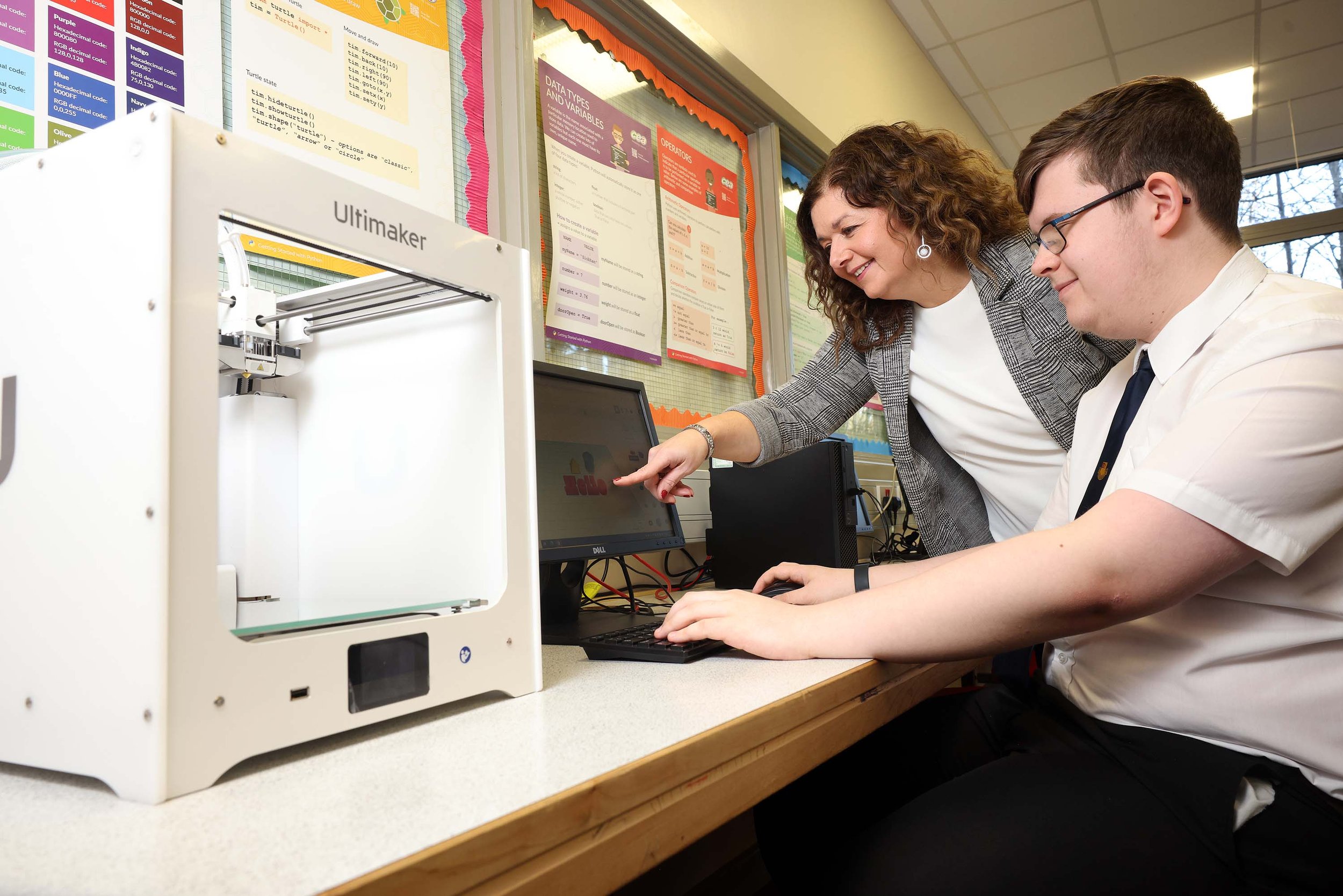ICT and Computing
Aims
The ICT/Computing Department aims to:
Develop, maintain and stimulate students’ inquisitiveness, interest and enjoyment in using ICT and Computing
Develop pupils’ competence in a range of computing and ICT skills
Develop pupils’ ability to manage and present information effectively through the use of ICT
Enable pupils to develop transferable ICT skills that can be applied to situations across all curriculum subjects
Enable pupils to make reasoned, mature decisions on the usability and appropriateness of data and resources
Enable pupils to develop an understanding of the use of ICT and Computing in commerce, business and industry
Enable pupils to develop an understanding of computational thinking skills
Staff
Mrs Buchanan
Mr Patterson
Mr Poots
Mrs Carey
Mrs Ryan
Miss Stewart
Mrs Drury
Miss Wedge
Mr Curtis (Senior Technician)
Mr Larkin (Technician)
Key Stage 3
The course aims to prepare pupils with appropriate ICT and Computing skills. To broaden their knowledge and understanding in a wide range of application areas so to enable the effective use of ICT across all their subjects and eventually within the world of work.
Year 8
Computer safety and personal safety
Email Etiquette
ESafety & Cyber safety
General software applications – MS PowerPoint, MS Word, Excel, internet
Spreadsheet modelling
Databases
Programming with LOGO
Multimedia design
Year 9 (Intermediate Level)
Computer safety and personal safety
Email Etiquette
ESafety & Cyber safety
General software applications – MS PowerPoint, MS Word, Excel, internet
Spreadsheet modelling
Databases
Programming with LOGO
Multimedia design
Year 10 (Advanced Level)
Computer safety and personal safety
Email Etiquette
ESafety & Cyber safety
General software applications – MS PowerPoint, MS Word, Excel, internet
Spreadsheet modelling
Databases
Programming with LOGO
Multimedia design
GCSE
CCEA, Digital Technology
Unit 1: Digital Technology - 30%
An external written examination taken at the end of year 11. Topic Themes:
• Digital data
• Software
• Database applications
• Spreadsheet applications
• Computer hardware
• Network technologies
• Cyberspace, network security and data transfer
• Cloud computing
• Ethical, legal and environmental impact of digital technology on wider society
• Digital Applications
Unit 2: Digital Authoring Concepts - 40%
An external written examination taken at the end of year 12. Topic Themes:
• Designing solutions
• Digital development considerations
• Multimedia applications
• Multimedia authoring
• Database development
• Testing and developing test plans
• Evaluations of digitally authorised systems
Unit 3: Digital Authoring Practice - 30%
A Controlled assessed portfolio of coursework. Topic Themes:
• Designing solutions using appropriate tools
• Building and testing a solution
• Evaluating a solution
Method of Assessment and value
Unit 1: 40% external written exam (year 11)
Unit 2: 30% external written exam (year 12)
Unit 3: 30% controlled assessment (year 12)
Grading - Grades achieved A* to G
OCN NI, Level 2 Certificate in IT Applications
Unit 1: Digital Technology
Controlled Assessment
Credit Value: 3
Unit 2: Email Software Skills
Controlled Assessment
Credit Value: 3
Unit 3: Multimedia Software
Controlled Assessment
Credit Value: 4
Unit 4: Presentation Software
Controlled Assessment
Credit Value: 2
Unit 5: Word Processing Software
Controlled Assessment
Credit Value: 3
Method of Assessment and value
All units are assessed through portfolios/coursework.
No written examination
5 controlled assessments are required
All 5 units equal a credit value
15 credit points are required to pass this course
Grading
Assessment Grade B or Fail
Post 16
Information Technology
Course Details: BTEC Nationals Level 3 Extended Certificate in IT
Unit 1: Information Technology Systems
Unit 2: Creating Systems to Manage Information
Unit 3: Using Social Media in Business
Unit 5: Data Modelling
Method of Assessment and value
Unit 1 34% external written exam (year 13)
Unit 2 25% external written synoptic exam (year 13)
Unit 3 25% mandatory coursework (year 14)
Unit 5 16% mandatory coursework (year 14)
Grading
Distinction*, Distinction, Merit and Pass
Course Details: BTEC Nationals Level 3 Diploma in IT
Unit 1: Information Technology Systems
Unit 2: Creating Systems to Manage Information
Unit 3: Using Social Media in Business
Unit 4 Programming
Unit 5: Data Modelling
Unit 9: IT Project Management
Unit 11: Cyber Security and Incident Management
Unit 18: Digital Animation and Effects
Method of Assessment and value
Unit 1 34% external written exam (year 13)
Unit 2 25% external written exam (year 13)
Unit 3 25% external written exam (year 14)
Unit 4 25% external written exam (year 13)
Unit 5 16% external written exam (year 14)
Unit 9 25% external written exam (year 14)
Unit 11 34% external written exam ((year 13)
Unit 18 16% external written exam (year 14)
Grading
Distinction*Distinction*,
Distinction*Distinction,
Distinction Distinction
Distinction Merit
Merit Merit
Merit Pass
Pass Pass
Skills Developed
Word Processing
Spreadsheets
Databases
Programming
PowerPoint
Graphics
Digital Sound
Digital Video
Explore – access, manage, research and interpret information
Express – create, develop and present information
Exchange – communicate and share
Evaluate – review, reflect and improve work
Careers
Computer Operator
User Support Manager
IT Software Trainer
Web designer
Web Analyst
Graphic Designer
Architect
Accountant
Software Engineer
ICT Teacher
ICT Technician
Games Software Designer
Engineer



